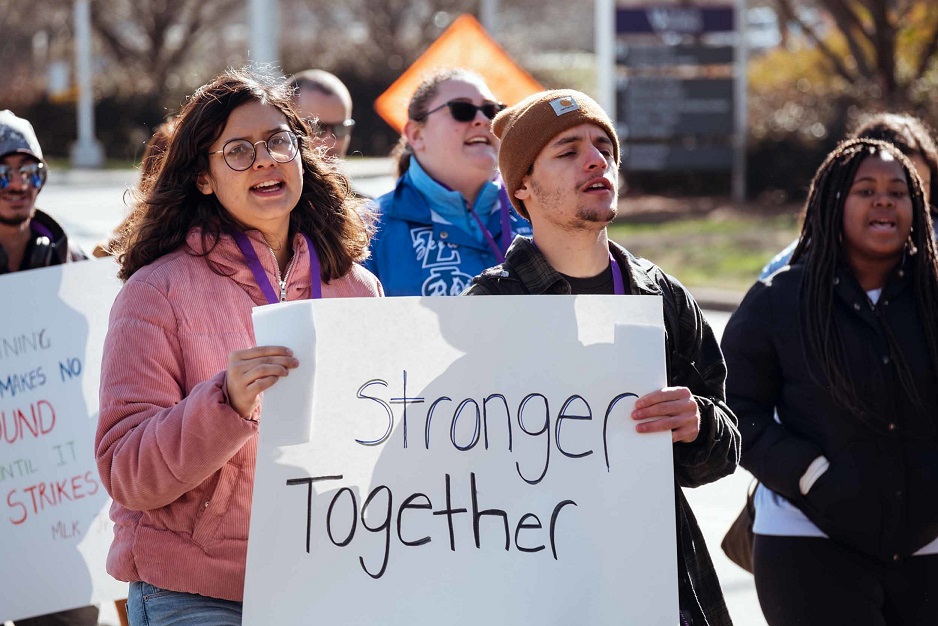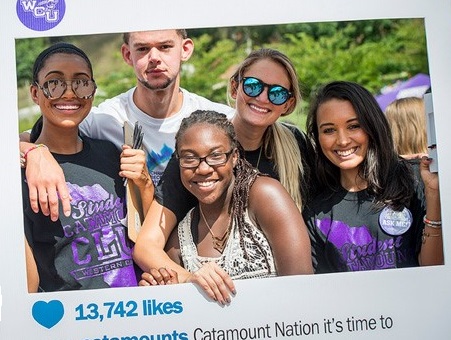Social Justice Minor

Martin Luther King March
“There is no such thing as a single-issue struggle because we do not live single-issue
lives” -Audre Lorde
The Social Justice minor is designed to help students engage in critical examinations of various forms of injustices, the power structures that maintain those injustices, and how those injustices intersect in the experiences of oppressed peoples of the world. The minor will also examine how the struggles of the oppressed create social change even as they experience the challenges and joys of working towards a just world. The minor will focus on praxis (putting theory into practice), culminating in a capstone social justice focused service-learning experience. In order to do social justice work, we must view the world through multiple disciplines and engage complex problems using diverse perspectives. Students will explore ideas and practices around diversity, inclusion, equity, and social justice through various lenses (e.g., education, leisure, criminal justice, psychology, communication, environmental science and justice, history, etc.) in this truly interdisciplinary minor.
For the purpose of this minor, we define social justice as a process, goal, and orientation focused on action. “Social justice…is committed to the break down, challenge, and change of social structures that perpetuate marginalization, discrimination, and oppression [and exploitation of the human and non-human] from its start to its finish” (Fernandez et al., 2020, p.3).
Upon successful completion of the Social Justice Minor, students will be able to demonstrate a greater awareness, understanding, analysis, and application of the following:
- Their own membership in multiple identity groups in society, and how those identities inform how they experience the world.
- Structures of power such as capitalism, imperialism, colonialism, and white supremacy that sustain various forms of injustices.
- Key terms associated with education for social justice such as “diversity vs. inclusion vs. social justice,” “equality vs. equity,” “privilege,” “oppression,” “power,” “ally,” and “intersectionality.”
- Distinctions among various forms of systemic injustice (such as racial, gender, economic, environmental) propagated at individual, institutional, and societal levels.
- Challenges and possibilities for or resistance to social change through social movements.
- Strategies for applying what they have learned by collaborating with community partners to plan, implement, and critically evaluate individual and collective action for equity and social justice.
The Social Justice Minor is 18 credit hours. Students will take three required core courses (for a total of 9 credit hours) and then choose 3 elective courses (totaling 9 hours) from a list of pre-approved SJ Minor Electives.
Required Core Courses:
Introduction:
SJ 275 – Diversity and Inclusion (3 credit hours) or PRM 275 Diversity & Inclusion
in PRM (3 credit hours)
Course Description: This course seeks to foster social justice, equity, diversity,
and inclusion in our communities by assisting students in gaining the awareness, understanding,
knowledge, and skills to work with those of differing abilities, socio-economic status,
gender, race and ethnicity. Students will gain understanding, knowledge, and skills
through experiential class sessions, guest speakers, and collaborative presentations
and projects.
Theories:
SOC 392 – Theories in Social Justice (3 credit hours)
Course Description: The Social Justice Theory course will encourage students to critically
examine how structures of power such as capitalism, imperialism, colonialism, white
supremacy, hetero-patriarchy sustain various forms of injustices that shape the experiences
of the most oppressed peoples of the world. The course will also examine how the possibility
of a different kind of world lies in the past and present day struggles of the oppressed
even as they experience resistance, challenges, and joys of working towards a just
world. We will also examine how some actions for social change may have harmed rather
than helped the most oppressed amongst us. Readings for this course will include both
classical and contemporary writings on social justice issues.
Capstone:
SJ 475– Social Justice Capstone (3 credit hours)
Course Description: The Social Justice Capstone Course is designed to provide students
minoring in Social Justice the opportunity to make a practical, applied social justice
impact to better the WCU, local, regional, state, or national community. This course
is focuses on praxis, bridging theory and practice. Students will read and discuss
social theory and explore current social justice issues. The course will culminate
in a comprehensive social justice-focused project in partnership with an outside agency
of the student’s choosing, and in relation to the student’s major field of study.
Electives:
Students will select three (3-credit) courses (9 total credit hours) from the following list of pre-approved courses. As an interdisciplinary minor, it is expected that students will engage in courses from multiple prefixes that provide perspectives from various industries and systems that make up our communities. Therefore, students must choose electives from at least two different prefixes. Other courses may be substituted into the minor with approval of the program director.
Pre-Approved Program Electives*:
*Note: New electives are added every semester. Please see your degree audit for most
current list of electives. If you would like to take a course that you believe fits
the minor, please see program director for approval.
ANTH 351 Environmental Anthropology
ANTH 461 Indians of North America (name change pending: Indigenous Cultures of North
America)
ANTH 370 Human Biological Variations
ANTH 419 Comparative Family
CJ 305 Social Justice and the Law
CJ 438 Minorities, Crime and Social Policy
COMM 414 Gender Communication
COMM 415 Intercultural Communication
EDCI 305 Global Educational Systems
EDCI 360 Social Justice in Education (3 credit hours) (required for all students in
the Social Justice S.A.C.)
EDMG 300 Culturally and Linguistically Diverse Middle Grades Students
GBS 200 Introduction to Black Studies
GBS 300 Key Paradigms and Theories in Black Studies
HIST 237 African American History
HIST 337 History of Slavery
HIST 345 Modern Native America
HSCC 205 Women's Health
HSCC 420 Cultral Diversity for Health Care
LAW 306 Women and the Law
LEAD 249 Diversity and Leadership
LEAD 300 Leadership for Racial Justice
LEAD 301 Women-Centered Leadership
NAS 452 Roots of Health Disparities Among Native American Populations
NAS 474 Issues in Indian Health
PAR 121 Religious Ethics: Global Faiths & Moral Problems
PAR 260 Religion, Gender, Sexuality
PAR 317 Feminist Thought
PAR 319 Philosophy of Race
PSC 316 Gender & Politics
PSC 353 International Political Economy
PSC 370 Ethnic Conflict
RTH 200: Foundations of Rec Therapy
SOC 195 Sociology of Black America
SOC 235 Social Problems
SOC 245 Social Inequality
SOC 326 Sociology of Gender
SOC 333 Sociology of Mental Health & Illness
SOC 365 Sociology of Family
SOC 342 Individual in Society
SOC 371 Society & Environment
SOC 373 Global Society
SOC 410 Sociology of Aging
SOC 414 Race & Ethnicity
SOC 417 Immigration
SOC 423 Sociology of Sport
SOC 448 Social Movements
SOC 450 Sociology of Work
SOCW 251 Social Issues, Policies, and Programs
SPED 240 The Exceptional Child

Interested in studying Social Justice?
You may also be interested in these related minors at WCU:
Cherokee Studies Minor
Global Black Studies Minor
Latinx Studies Minor
International Studies Minor
